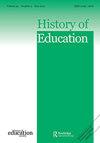The quickening of the national spirit: Cecil Sharp and the pioneers of folk-dance revival in English state schools (1900-26).
IF 0.4
4区 教育学
Q4 EDUCATION & EDUCATIONAL RESEARCH
引用次数: 9
Abstract
In 1910, Cecil Sharp (1859± 1924) , as an Inspector of Training for Teachers at the Board of Education, wrote, ìn order that a boy or girl may become a good Englishman, or a good Englishwoman, training in English characteristics must be a prominent feature in educationÐ English History, English games, English ideals are of the utmost importance. A wholly national and, at the same time, a wholly spontaneous expression is found in folk-dances and songs.’ Sharp became the driving force behind the English folk-dance revival which commenced during the early years of the twentieth century and emanated from the work of the Folk-Song Society which had been founded in 1898. When the English Folk-Dance Society was established in 1911 its purpose was to disseminate a knowledge of English Folk-Dances, Singing Games and Folk-Songs and to encourage the practice of them in their traditional forms. The Society, with its sta of quali® ed teachers, local correspondents and several regional branches, provided instruction, resources and vocational courses at the Shakespeare Memorial Theatre, Stratford-upon-Avon. The Society promoted folk-dance in educational and recreative contexts and gave practical help by arranging classes, demonstrations and competitions. The quickening of the national spirit through dance did not become a living reality until a systematic e ort to recover what had virtually become an extinct dance heritage was undertaken by Cecil Sharp, who based his theories on those of Sir James Frazer, an anthropologist and folklorist. Sharp had been collecting folk songs in Oxfordshire in 1899 when he encountered a group of morris dancers from Headington. Although ® ve years lapsed between this meeting and the eventual reconstruction, demonstration and teaching of the dances to others, the role of folk-dance collector and disseminator soon emerged as the major commitment in his life. He searched the countryside, befriended village elders and persuaded them to whistle or play the tunes to him and to show or describe dance steps and ® gures. He民族精神的复兴:塞西尔·夏普和英国公立学校民间舞蹈复兴的先驱(1900-26)。
本文章由计算机程序翻译,如有差异,请以英文原文为准。
求助全文
约1分钟内获得全文
求助全文
来源期刊

History of Education
Multiple-
CiteScore
0.80
自引率
0.00%
发文量
70
期刊介绍:
History of Education has established itself as a leading, international, peer-reviewed journal, focusing on the history of education in all parts of the world. The journal is recognised as a key resource for both educationists and social historians alike. The journal publishes original research and major reviews of books in the history of education. Papers dealing with both formal and informal education systems, comparative education, policy-making, the politics and experience of education and pedagogy are welcomed.
 求助内容:
求助内容: 应助结果提醒方式:
应助结果提醒方式:


